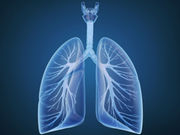Increase in hazard of death with higher mean pulmonary arterial pressure, with no threshold seen
THURSDAY, Oct. 26, 2017 (HealthDay News) — For patients undergoing right heart catheterization (RHC), borderline pulmonary hypertension (PH) is associated with increased risk of mortality, according to a study published online Oct. 25 in JAMA Cardiology.
Tufik R. Assad, M.D., from Vanderbilt University School of Medicine in Nashville, Tennessee, and colleagues conducted a retrospective cohort study involving patients undergoing routine RHC for clinical indication. Patients were classified according to mean pulmonary arterial pressure (mPAP) values as reference, borderline PH, and PH (mPAP values of ≤18, 19 to 24, and ≥25 mmHg, respectively).
The researchers found that the prevalence of PH and borderline PH was 62 and 18 percent, respectively, among 4,343 patients. Independent associations were seen for advanced age, features of the metabolic syndrome, and chronic heart and lung disease with increased likelihood of borderline PH versus reference patients. Borderline PH was correlated with increased mortality compared with reference patients after adjustment for 34 variables (hazard ratio, 1.31). With higher mPAP there was an incremental increase in the risk of death, without an observed threshold. Sixty-one percent of the 70 patients with borderline PH who underwent repeated RHC had developed overt PH, with a 5 mmHg median increase in mPAP (interquartile range, -1 to 11 mmHg; P < 0.001).
“Borderline PH is common in patients undergoing RHC and is associated with significant comorbidities, progression to overt PH, and decreased survival,” the authors write.
Several authors disclosed financial ties to the pharmaceutical industry.
Copyright © 2017 HealthDay. All rights reserved.








